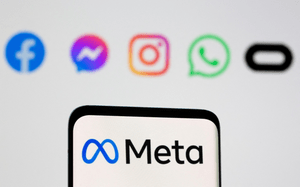Breaking free from digital dominance of the West: The case for an Indian-owned messaging platform

In an article written by Rebecca Kern published in Politico in 2024, it was alleged that WhatsApp had been operating for over eight months worldwide without explicit election-disinformation policies. While Meta has implemented stringent guidelines against voter interference, threats of violence, and election misinformation on platforms like Facebook, Instagram, and Threads, it has not applied these same rules to WhatsApp Channels.
Instead, the company relies on broader community guidelines, which poses significant risks to the integrity of democratic processes globally. This situation is very important as independence extends beyond traditional political freedoms to include control over digital communication. Messaging applications typify digital communication. Messaging applications have transformed global connectivity, enabling seamless interactions across vast distances with just a few taps. However, the concentration of power within a few technology giants raises critical concerns about national security, data privacy, and cultural sovereignty.
The dominance of WhatsApp in India’s communication landscape is a case in point. With user projections expected to reach 795.67 million in India by 2025, WhatsApp has become an integral part of the country’s communication infrastructure.
However, this convenience comes at the cost of a monopolistic entity, which raises significant concerns. The heavy reliance on a foreign platform exposes the country to vulnerabilities that a single external entity could exploit. This situation raises critical concerns regarding national security, data privacy, and cultural sovereignty, making it imperative for India to recognise the necessity of developing its own messaging platform. Alternatively, encourage utilisation of other messaging services such as Signal or Telegram to encourage competition that will likely benefit users.
One of the most significant concerns with this concentration of power is the unchecked spread of misinformation, especially during politically sensitive periods like elections. For instance, one political party might disseminate false information to discredit its opponents. Without alternative messaging platforms, any rebuttal must rely on the same medium. However, if the owner of that medium were to show bias toward a particular political party, it could manipulate the platform by blocking or slowing the distribution of counter-messages. This manipulation would create an uneven playing field, giving one side an unfair advantage in the political arena and undermining the integrity of democratic discourse.
Further, when a country’s communication infrastructure is heavily dependent on a single foreign platform, it becomes vulnerable to exploitation by external forces. The revelations of global surveillance programs have made it clear that no data is truly private when stored on foreign servers. In India’s complex geopolitical landscape, the risks associated with these vulnerabilities are too substantial to ignore. While WhatsApp offers end-to-end encryption for the content of its messages, the metadata generated by user interactions—details such as who is communicating with whom, when, and for how long—remains accessible to the platform’s parent company, Meta.
Recent AI tools added to WhatsApp further accentuate the point that encrypted data can possibly be harvested for commercial gains. This metadata, which can be as revealing as the content of the messages themselves, is subject to analysis and potential misuse. For instance, in 2018, the Cambridge Analytica scandal demonstrated how user data, including metadata, could be harvested and exploited for political manipulation. Although the incident did not directly involve WhatsApp, it illustrates the broader risks associated with allowing foreign entities to control critical communication platforms.
Moreover, the concentration of control over sensitive communications in the hands of a foreign entity raises serious concerns about data privacy and sovereignty. In today’s digital age, data has become one of the most valuable commodities, often referred to as the “new oil.” The data generated by Indian users on foreign messaging platforms is frequently stored on servers located outside the country, placing it beyond the reach of Indian laws and regulations.
This situation undermines India’s data sovereignty, as it effectively cedes control over its citizens’ personal information to foreign corporations. The recent push by the Indian government for data localisation—mandating that data generated within India be stored on local servers—is a step towards reclaiming this sovereignty.
However, without the widespread use of alternatives to platforms like WhatsApp, true data sovereignty remains elusive. An indigenous messaging app would ensure that Indian data is not only stored within the country’s borders but also governed by Indian laws, providing greater protection against unauthorised access by foreign entities.
Ongoing legal challenges further intensify the debate over India’s digital sovereignty. The Indian government’s 2021 Information Technology (IT) rules require social media intermediaries to trace chats and identify the first originator of information. This move is aimed at curbing misinformation and enhancing accountability, but it has faced resistance from entities like WhatsApp, who argue that it compromises user privacy.
Beyond the immediate concerns of national security and data privacy, the dominance of foreign messaging platforms in India also threatens the country’s cultural integrity. These platforms, designed within specific cultural contexts, may not fully honour or understand Indian values, leading to the spread of misinformation and the polarisation of communities. This form of digital dominance can erode social cohesion and cultural identity.
Developing an indigenous messaging app offers India a chance to protect its cultural narratives while fostering economic independence and innovation within its tech sector. By investing in homegrown solutions, India can reduce its reliance on foreign platforms, aligning with the ‘Atmanirbhar Bharat’ initiative and positioning itself as a global leader in digital innovation.
It is interesting to note that mobile service providers such as Jio, Airtel, BSNL, and Idea-Vodafone have not even attempted to offer an attractive messaging alternative despite market attractiveness. Why do these mobile service providers offer no such messaging application that is attractive, easy to use, and useful?
Therefore, developing an indigenous messaging app is not just about technological innovation; it is about securing India’s digital sovereignty and ensuring that its communication infrastructure is aligned with national interests. Initially, the alternative messaging app could be mandated in the armed forces, Central Armed Police Forces (CAPF) and police after ensuring its robustness and safety in sensitive environments. Once proven effective, the app can be gradually rolled out to government and quasi-government bodies, allowing for a controlled and strategic deployment.
After these phases, the app can be made available to the general public, ensuring that India’s communication infrastructure is secure, self-reliant, and aligned with national interests. This approach not only addresses national security concerns but also fosters a culture of digital independence within the country.











